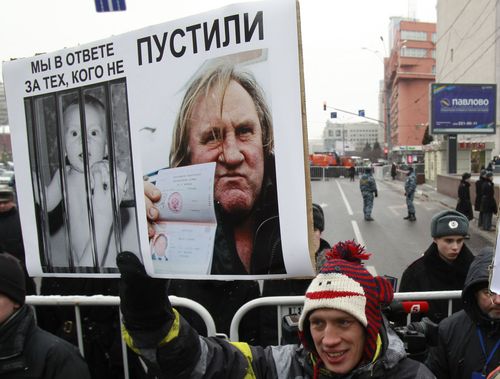“Society in Russia does not turn its back to politics anymore”
Expert speaks about the “march against rascals” which has taken place in Russia
In spite of frost and recent holidays, thousands of Russians went out to Moscow streets to rally against the “Dima Yakovlev Bill” passed by the State Duma in December 2012. The “march against rascals,” according to official estimations of law enforcers (which, however, not always meet the reality) gathered only 7,000 people. The activists counted over 50,000 people who rallied against the State Duma’s decision, which bans Americans from adopting Russian orphans. And according to Gazeta.ru, over 80,000 people have joined the march. “Taking into account that it was by far the first action, which was organized almost without any assistance from the leaders of the protest, it may be considered quite successful,” Novaya Gazeta writes.
According to the BBC Russian service, the organizers of the march made and handed out to the participants about 600 placards with portraits of all the State Duma MPs, members of the Federation Council and high-ranking officials, who voted for or advanced this law.
The march started near the Pushkinskaya Square and finished on Academician Sakharov Avenue, where the participants of the meeting threw away the placards with MPs to the garbage can.
An analogical action has also taken place in Russia’s second largest city Saint Petersburg. The “Rally against the Law of Rascals,” which was held on the Field of Mars, gathered 2,000 people.
The Day asked expert and editor-in-chief of the magazine Pro et Contra of the Moscow Carnegie Center Maria LIPMAN to comment on the action.
“As for the title of the action, the word ‘rascal’ appeared almost immediately in the context of this law. Even on Russian Twitter this hash tag was the most popular at some point of time.
“According to the intention of the organizers of the march, this action was not against the law, rather about the people who voted for it. They offered a different kind of program [from the previous meetings. – Ed.] – to name concretely all those who deserve the title of ‘rascal’ due to the fact that they voted for the law banning US citizens from adopting Russian orphans. Namely the fact that people were carrying photos of specific persons made this meeting special.
“How successful are such actions? A lot depends on what criterion of successfulness we take. If we say that the reconsideration of this decision by the State Duma, the president, or the Upper Chamber should become this criterion, clearly it was insufficient. Today the Presidential Administration remains the ‘center of decision-making.’ The Kremlin and the president personally are keeping control of governmental institutions, legislative power, and security services.
“This action seems to me inefficient as a force to considerably influence the decision-making process, or the already approved decision. However, the protests which have been taking place for a bit more than a year are proof of considerable improvements both in Russian society, and all the relations between the society and the state. They don’t determine the policy of government in the direction the participants of protest rallies desire, yet they make the power act in a new, different way. In particular, it includes the toughening of the Kremlin’s policy: moving from manipulative methods to repressive ones. This is a course towards splitting of Russian society, mobilization of support of a more conservative part, and presenting the protesters and those who sympathize with them as non-patriotic citizens by all means. This is quite a determined and dangerous course, which has been kept for a long while and may entail a non-desirable development of the events for Russia.
“Without doubt, such a change is a consequence of the fact that the society in Russia is no more standing its back to politics. For quite a long time it has been sending signals to the government: ‘We do care!’ and ‘We want to influence!’ Therefore the Kremlin’s policy has been changing.
“Proof of this is that the most important resource of stability. i.e., the society’s apathy and refusal from taking part in policy, which Russian government and President Putin (during 12 years of holding the country’s leading positions) had at their disposal, has come to an end. Definitely, this is an effect produced by protest actions. According to surveys, Putin’s rating remains relatively high, nonetheless his popularity is decreasing, albeit slowly, and legitimacy is diluted. I think this process cannot be reversed.
“Many state officials have also taken part in the march against the ‘anti-orphan law.’ The representatives of Russian elite expressed their opinion on the adoption of the law, albeit in a diplomatic and reserved manner. This is a substantial and big achievement, this is what we lacked previously.”






